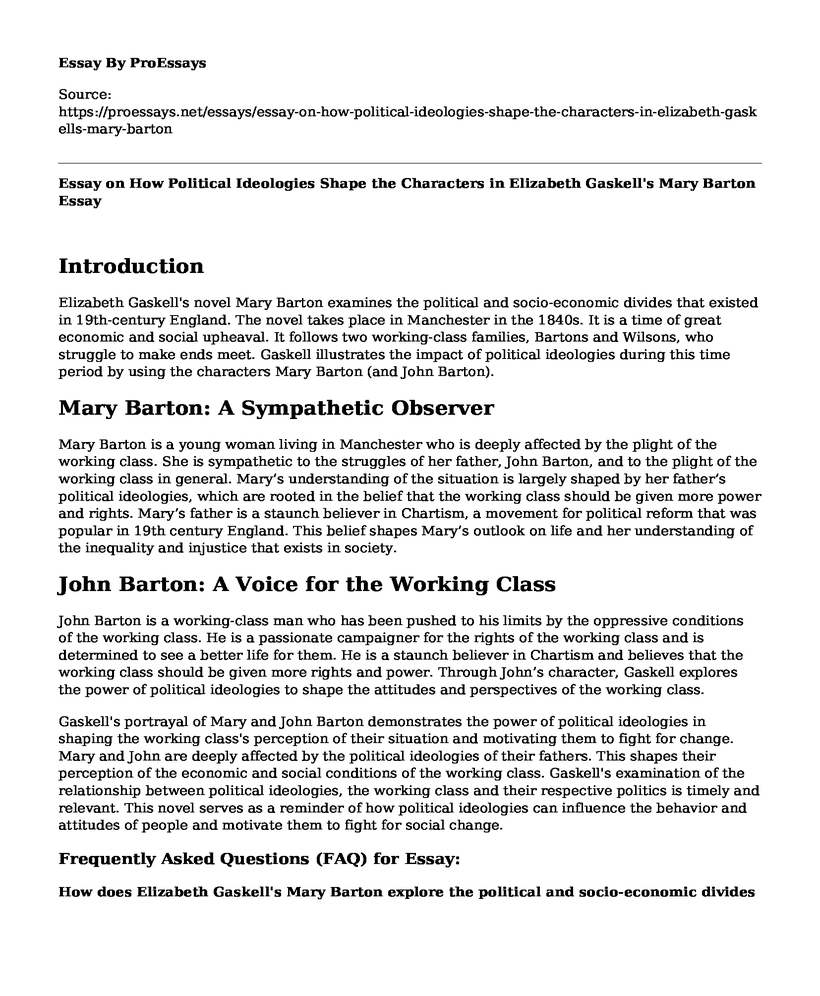Introduction
Elizabeth Gaskell's novel Mary Barton examines the political and socio-economic divides that existed in 19th-century England. The novel takes place in Manchester in the 1840s. It is a time of great economic and social upheaval. It follows two working-class families, Bartons and Wilsons, who struggle to make ends meet. Gaskell illustrates the impact of political ideologies during this time period by using the characters Mary Barton (and John Barton).
Mary Barton: A Sympathetic Observer
Mary Barton is a young woman living in Manchester who is deeply affected by the plight of the working class. She is sympathetic to the struggles of her father, John Barton, and to the plight of the working class in general. Mary’s understanding of the situation is largely shaped by her father’s political ideologies, which are rooted in the belief that the working class should be given more power and rights. Mary’s father is a staunch believer in Chartism, a movement for political reform that was popular in 19th century England. This belief shapes Mary’s outlook on life and her understanding of the inequality and injustice that exists in society.
John Barton: A Voice for the Working Class
John Barton is a working-class man who has been pushed to his limits by the oppressive conditions of the working class. He is a passionate campaigner for the rights of the working class and is determined to see a better life for them. He is a staunch believer in Chartism and believes that the working class should be given more rights and power. Through John’s character, Gaskell explores the power of political ideologies to shape the attitudes and perspectives of the working class.
Gaskell's portrayal of Mary and John Barton demonstrates the power of political ideologies in shaping the working class's perception of their situation and motivating them to fight for change. Mary and John are deeply affected by the political ideologies of their fathers. This shapes their perception of the economic and social conditions of the working class. Gaskell's examination of the relationship between political ideologies, the working class and their respective politics is timely and relevant. This novel serves as a reminder of how political ideologies can influence the behavior and attitudes of people and motivate them to fight for social change.
Cite this page
Essay on How Political Ideologies Shape the Characters in Elizabeth Gaskell's Mary Barton. (2022, Dec 16). Retrieved from https://proessays.net/essays/essay-on-how-political-ideologies-shape-the-characters-in-elizabeth-gaskells-mary-barton
If you are the original author of this essay and no longer wish to have it published on the ProEssays website, please click below to request its removal:
- Edgar Allan Poe and Victorian Morality
- The Role of the Narrator in Harper Lee's To Kill a Mockingbird: Literary Analysis Essay
- "Where the Bastard Is God" Poem Analysis Essay
- Essay Sample on Medusa as a Powerful Creature
- A Hope More Powerful Than the Sea by Melissa Fleming - Literary Essay Sample
- Essay on Reaping What Our Ancestors Sowed: A Metaphorical Look at African American Slavery
- Essay Example on Eugenie Grandet and Hero of Our Time







